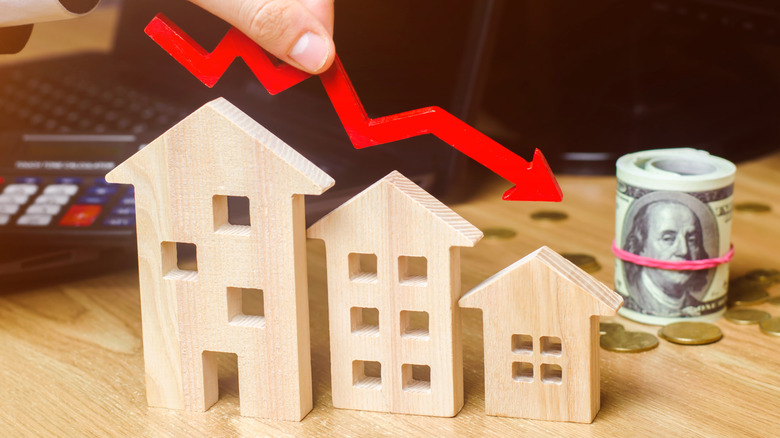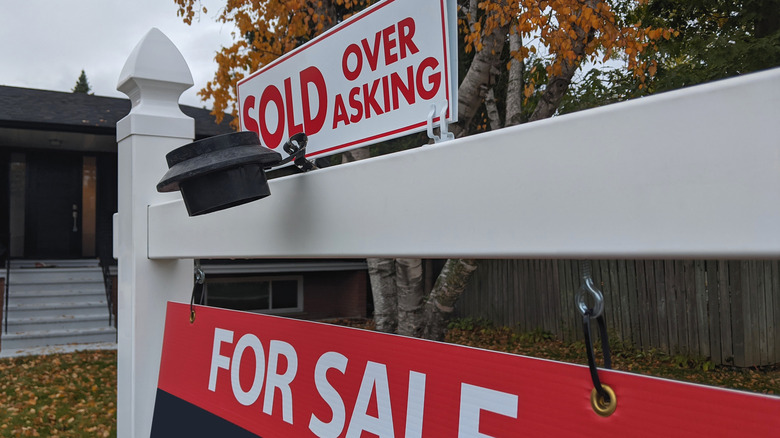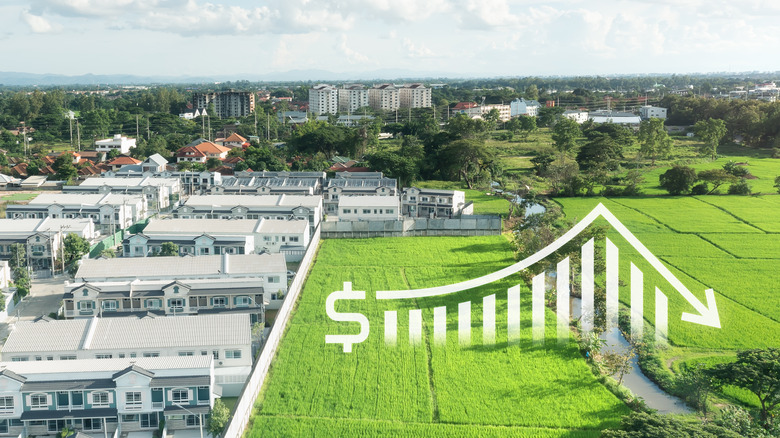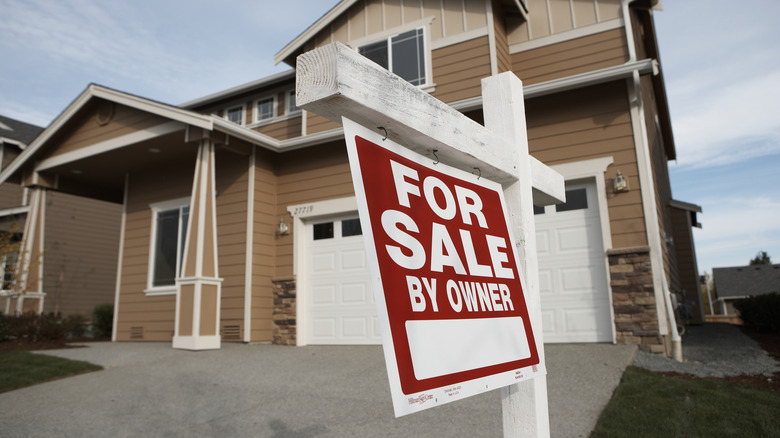Will There Be A Housing Crash In 2023 Similar To 2008? A Real Estate Expert Weighs In
The housing market crash of 2008 is noted for many things, including being one of the worst real estate climates in the country's history, as noted by Investopedia. The perfect storm of lenders offering subprime mortgages to consumers who had low credit scores and limited financial ability to afford a home, along with adjustable-rate mortgages that allowed loan payments to change over time, created financial chaos for many lenders and borrowers. Preceding the crash, consumer debt rose to $2 trillion and mortgage-related investment products grew in demand. Eventually, the financial markets began to fall, and by September of 2008, they were down almost 20% from the previous year.
This created a drop in the housing market where home values fell significantly. It also led to high foreclosure rates and the potential for financial ruin. With the economy flexing again in 2022, many worry about what's coming next year. Could it be just as troublesome as it was in 2008? Is the current housing market the worst it's ever been? In an exclusive interview with House Digest, Jon Sanborn, co-founder of Brotherly Love Real Estate, shares his expert opinions and insights on the topic.
A look at the numbers
Jon Sanborn shares that it's helpful to focus on the numbers as a guide to what could occur in the coming year. "Between June 2022 and late 2024, Morgan Stanley is predicting a 5% to 10% drop in the average house prices. These numbers may appear dangerous, but we must understand the context," he advises. For example, if a home is worth $200,000 today and a 10% drop occurs in the next year or so, that could lower the home's value to $180,000.
To clarify whether or not a true crash is likely to occur, Sanborn assures us with this insight. "This type of market cooling is not cataclysmic. For a crash, the numbers would have to be in the range of 20% or higher. However, even then, things would not be as bad as the 2008 crash that affected employment as well." To expand on Sanborn's point, consider that a total of 2.6 million jobs were lost in 2008, making it the largest loss of employment since 1945 (via The New York Times).
Fallout from the COVID-19 pandemic
It's also essential to look at what preceded the current fluctuations in the real estate market. As noted by Jon Sanborn, there was certainly a rapid shift in 2020. "During the pandemic, the housing market was unsustainable," he says. "Home values skyrocketed by about 45%, indicating the seller's market. But at some point, the growth will recede. The housing market has outpaced the ability of the buyer to afford a home."
Consider that a home worth $200,000 in 2019 could have grown in value to $280,000. Those purchasing a home did not see their income grow as quickly, so over the last few years, consumers have been priced out of the market as a result. With fewer people capable of affording a home at such high prices, buyers simply cannot make a purchase as easily today. That's quite different than the reasons behind the 2008 crash, which included poor lending practices.
Impacts of the housing shortage
You may have tried to buy a home in 2021 or 2022 only to find there were very few units listed for sale within your target area. That's another big factor in the current housing market crunch, shares Jon Sanborn. "The housing shortage is the frontrunner in this scenario. Experts at Freddie Mac and Fannie Mae suggest that the U.S. needs around 4 million new homes." Sanborn also notes that "people want to buy homes but cannot due to the high prices and shortage in supply, [so] the demand will remain low."
Furthermore, per Sanborn, the circumstances of the current financial markets are much different from those that were prevalent in 2008. To this end, a key factor in the previous crash was that, in 2007, the country entered a recession, which ultimately led to several large financial organizations facing financial losses which required bailouts from the government. That pushed the markets even lower, creating the onset of the Great Recession, as noted by Federal Reserve History.
Home prices have started to drop
Some buyers are focused on home prices as a primary indicator of what's to come, and the market is already changing. As Jon Sanborn notes, "According to S&P, home values were down by 2.5% between June and September of 2022." Sanborn discusses why home values are falling by pointing to some of the West Coast cities most impacted. "San Francisco and Seattle had a drop of 10% and 9%, respectively. The San Francisco housing market is experiencing high interest rates and unaffordable house prices," he says.
With the COVID-19 pandemic, the option of working from home turned out to be very attractive for many people within the workforce. "With the pandemic, the city lost around 7% of its population between 2020 and 2021. This was due to remote working opportunities being available for tech workers that are largely concentrated in this region," explains Sanborn. "The effect of mass migration has had a significant impact on the city's real estate. Other cities such as Seattle and Portland have witnessed the same fluctuations." While this is a look at just one area of the country, it shows how complex the changes to the market could be in 2023.
The bottom line
Jon Sanborn makes it clear that the real estate market is changing, sharing his bottom line view. "The fundamental factor is that the U.S. housing market might recede in value through 2023, but [this] will not lead to a crash. Since there is low housing inventory, the demand is going to keep housing prices afloat."
Consumers considering buying a home at this time may see lower housing prices in the coming months, but they should not expect dramatic drops in value. For sellers, it could mean that selling sooner rather than waiting could yield better prices should the market continue to fall. More so, it's critical for buyers and sellers alike to take a close look at their cities and neighborhoods for a more realistic view of what could happen at the local level. Working with a good real estate agent should provide more insight into that area and make for a smooth home buying process all around.





